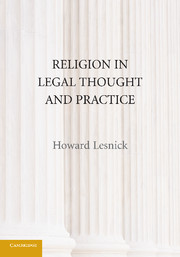Book contents
- Frontmatter
- Contents
- Preface
- I INTRODUCTIONS
- II MORAL OBLIGATION AND RELIGIOUS BELIEF
- III RELIGION AND SOME CONTEMPORARY MORAL CONTROVERSIES
- IV THE INTERACTION BETWEEN RELIGION AND THE SECULAR LAW
- 12 “Render unto Caesar”: Religion and (Dis)Obedience to Law
- 13 Religiously Grounded Morality and the Reach of Public Law
- 14 Capital Punishment
- 15 War
- V RESPONDING TO RELIGIOUS DIVERSITY
- VI RELIGIOUSLY GROUNDED MORAL DECISION-MAKING IN PROFESSIONAL LIFE
- Copyright Permission Acknowledgments
- Authors of Works Reprinted
- Scriptural Passages
- Index
13 - Religiously Grounded Morality and the Reach of Public Law
Published online by Cambridge University Press: 05 June 2012
- Frontmatter
- Contents
- Preface
- I INTRODUCTIONS
- II MORAL OBLIGATION AND RELIGIOUS BELIEF
- III RELIGION AND SOME CONTEMPORARY MORAL CONTROVERSIES
- IV THE INTERACTION BETWEEN RELIGION AND THE SECULAR LAW
- 12 “Render unto Caesar”: Religion and (Dis)Obedience to Law
- 13 Religiously Grounded Morality and the Reach of Public Law
- 14 Capital Punishment
- 15 War
- V RESPONDING TO RELIGIOUS DIVERSITY
- VI RELIGIOUSLY GROUNDED MORAL DECISION-MAKING IN PROFESSIONAL LIFE
- Copyright Permission Acknowledgments
- Authors of Works Reprinted
- Scriptural Passages
- Index
Summary
Non omne quod licet honestum est, according to a maxim of Roman law: “Not all that is permitted is honorable.” St. Paul expressed a similar thought in these (translated) words:
“We are free to do anything,” you say. Yes, but not everything is good for us. We are free to do anything, but not everything builds up the community. You should each look after the interests of others, not your own. (1 Corinthians 10:23–24 [Revised English Bible]).
To contend that prohibition by the standards of morality is, appropriately, more demanding than prohibition by the standards of law, is to affirm that legal norms will (again, appropriately) be narrower than moral norms. The degree to which that narrowness is appropriate is the subject of this chapter.
To a significant extent, one's views on that issue are a product of the perceived salience of three interrelated considerations:
– The extent to which the specific moral norm in question is the subject of widespread dissensus in our culture;
– The extent to which efforts to deter the conduct in question through law are acknowledged to raise serious questions of justice or political wisdom;
– The extent to which those who believe in the objective truth of one answer to a moral question are able and willing to acknowledge the possibility of morally legitimate and responsible conscientious disagreement with that answer.
The analyses that follow in this chapter focus mainly on the first and second factors. The third is more fully considered in Chapter 16.
- Type
- Chapter
- Information
- Religion in Legal Thought and Practice , pp. 412 - 434Publisher: Cambridge University PressPrint publication year: 2010



